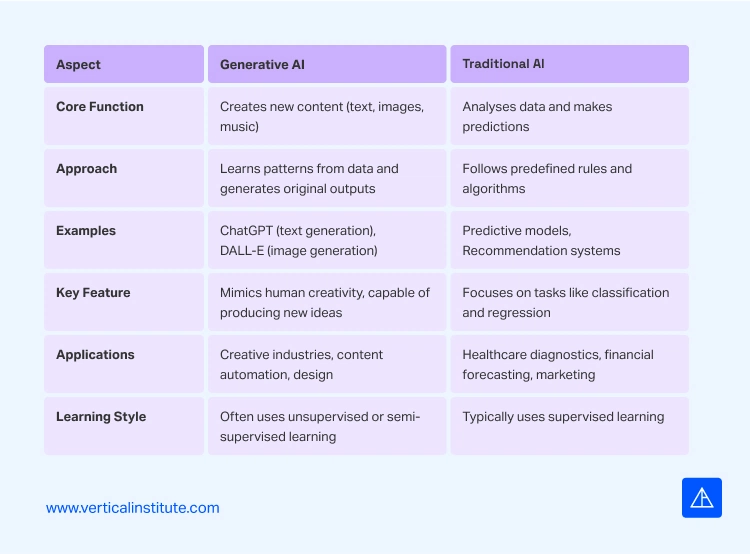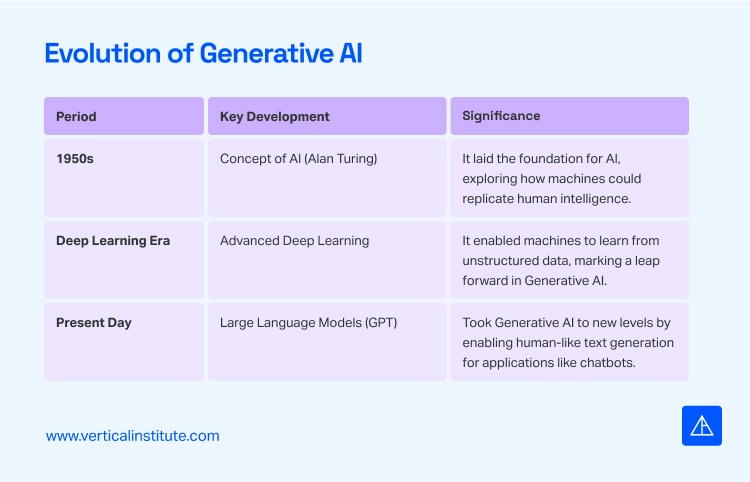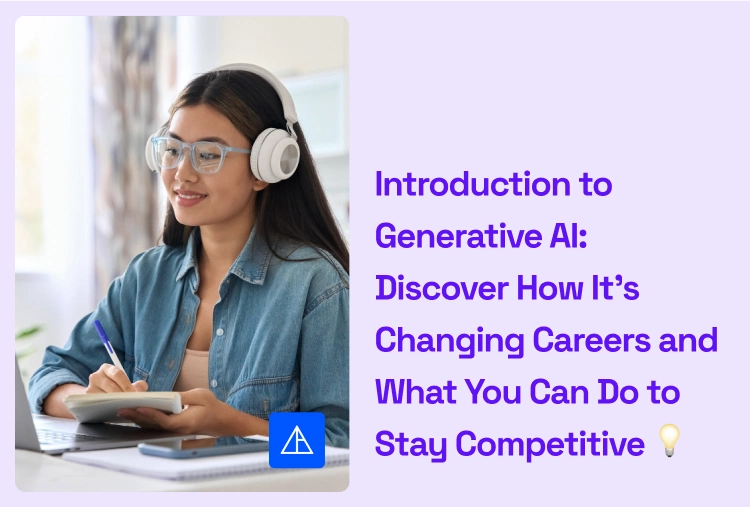Generative AI has rapidly become among the most impactful technologies in various industries. Bernard Marr, a leading futurist and tech expert, says this technology is transforming business and society. It can boost employee productivity by up to 40% and spark innovation in healthcare and education.
The Singapore government sees AI’s potential and is working to make the country a global hub for AI development. Statista projects the AI market in Singapore will hit US$4.64 billion by 2030, with industries like finance, healthcare, and marketing rapidly adopting AI to stay competitive.
This article will explore the fundamentals of Generative AI, tracing its evolution, highlighting recent developments, and examining its impact on industries. Additionally, we’ll look at how professionals in Singapore can prepare for the AI-driven changes shaping the future of work.
Related: AI in the Workplace: How AI is Redefining Careers in Singapore
What is Generative AI?
Generative AI is a form of artificial intelligence designed to create new content by learning patterns from existing data. It can generate text, images, music, and more by leveraging advanced models, making it highly versatile for creative and functional tasks.
The primary distinction between Generative AI and traditional AI is that traditional AI focuses on analysing data and making predictions. At the same time, Generative AI produces original content based on the data it has learned from. For instance, traditional AI might predict the weather, while Generative AI could write a unique article or create a new image from a textual description.

Some well-known examples of Generative AI include ChatGPT, which generates human-like conversations, and DALL-E, which creates images from text prompts. According to NVIDIA, these models use neural networks to identify patterns within vast datasets, allowing them to generate high-quality, diverse content across formats like text, images, and even 3D models.
Evolution of Generative AI

Historically, AI emerged in the 1950s with pioneers like Alan Turing, who explored how machines could replicate human intelligence. As Harvard’s Science in the News noted, these early foundations laid the groundwork for today’s sophisticated AI models, evolving into systems like Generative AI that can perform complex creative tasks.
Advanced deep learning was the real leap forward in Generative AI. By using multi-layered neural networks, deep learning enabled machines to learn from vast amounts of unstructured data. This breakthrough allows models to understand and generate complex outputs.
Introducing large language models like GPT took Generative AI to new heights. These models can generate human-like text based on a wide range of inputs, making them crucial in applications such as conversational AI, content generation, and more.
Recent Developments in Generative AI
Over the past decade, Generative AI has undergone significant advancements, transforming industries with innovative technologies like OpenAI’s GPT series, DALL-E, and Google’s BERT.
OpenAI’s GPT series
The release of GPT-3 and GPT-4 has revolutionised natural language processing, enabling machines to generate human-like text. These models power applications like ChatGPT, which can engage in complex conversations, generate content, and write code.
DALL-E
Developed by OpenAI, this model generates images from textual descriptions, making it a groundbreaking tool in creative industries like design and marketing. It allows businesses to produce high-quality visuals with minimal effort, driving content automation.
Google’s BERT (Bidirectional Encoder Representations from Transformers)
BERT has enhanced natural language understanding, revolutionising how search engines process user queries. This has profound implications for customer service, enabling more accurate and personalised interactions.
These advancements, as highlighted by Bernard Marr in his insights on Generative AI, showcase how the technology is a breakthrough and a vital tool for business innovation and efficiency.
Impact of Generative AI on Industries
Generative AI is transforming industries by automating complex tasks, enhancing decision-making, and unlocking new possibilities across various sectors:
Marketing and Creative Sectors
AI models like DALL-E and ChatGPT automate content creation, from generating ad visuals to writing marketing copy. These tools enable marketers to create personalised campaigns and streamline processes, improving efficiency and creativity. In the creative sector, AI-generated designs and hyper-personalised marketing strategies have become standard.
Healthcare
Generative AI enhances patient care through personalised treatment plans and automates medical coding and diagnostics tasks. It leverages large datasets to analyse medical images, enabling early disease detection and more efficient workflows. Conversational AI also helps reduce healthcare professionals’ workloads by handling routine inquiries.
Finance
In the financial sector, Generative AI is being used for risk assessment, fraud detection, and generating personalised financial advice. AI tools streamline onboarding processes, support customer service via chatbots, and offer tailored investment recommendations. The sector is also experiencing significant AI-driven growth, with financial institutions forecasted to spend over US$97 billion on AI by 2027.
How Singapore’s Professionals Can Prepare for AI-driven Changes
As Generative AI continues to gain traction globally, Singapore’s tech industry is rapidly adopting these advancements. To stay competitive, professionals must equip themselves with the right skills and tools to harness AI effectively.
1. Upskill in Generative AI and AI Technologies
Singaporean professionals can boost their careers by learning AI, machine learning, data science, and analytics through certification programmes. Vertical Institute offers courses that teach in-demand AI skills, including Generative AI. These programmes provide the practical knowledge needed to succeed in finance, healthcare, and marketing, helping professionals stay ahead in an AI-driven future.
2. Adopt AI Tools in Daily Workflows
Leveraging AI tools like ChatGPT for content creation or AI-powered analytics platforms for decision-making can improve productivity and efficiency. Professionals in marketing, finance, and healthcare can integrate AI tools to automate repetitive tasks, allowing them to focus on more strategic initiatives.
3. Stay Updated on AI Developments
With Singapore becoming a hub for tech innovation, staying informed about the latest AI developments is crucial. Attending AI conferences and tech events or participating in networking platforms like SGInnovate can help professionals stay ahead of industry trends.
Related: How To Secure Artificial Intelligence Jobs in Singapore
Conclusion
As AI evolves rapidly, professionals must stay updated on emerging trends, especially in Generative AI. With AI transforming industries globally, those who invest in upskilling will be better prepared to embrace future opportunities.
Through initiatives like the National AI Strategy, Singapore’s government prioritises AI adoption in sectors such as urban planning, transport, and healthcare. This opens up new opportunities for professionals to contribute to projects that have a lasting societal impact.
Related: AI Career Opportunities in Singapore: A Guide to Thriving in Tech
About Vertical Institute
Vertical Institute is shaping the future of work by preparing individuals for tomorrow’s job market. Our courses and certification focus on teaching essential skills and nurturing the next generation of innovators and leaders.
As an Approved Training provider (ATO) accredited by SkillsFuture Singapore (SSG) and the Institute of Banking & Finance Singapore (IBF), our courses adhere to the highest standards. They are government-subsidised and eligible for SkillsFuture Credits or NTUC UTAP Funding.



